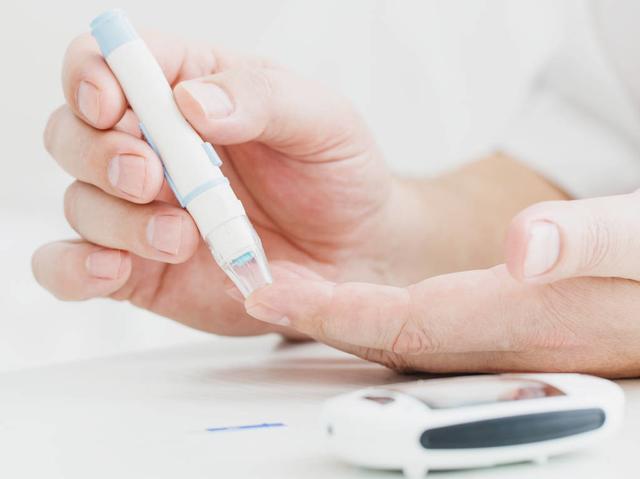Is it normal to have a fasting finger blood sugar of 6.9 in the morning?
The normal value of blood sugar according to international standards is 6.1, but he is not absolute, if the age of 60 years and above 7.0 or less can be. This period is called pre-glycemic, and if not intervened, it will definitely become diabetes after a few years.
I am 61 years old and a few years ago my fasting blood sugar was 6.23, I have been exercising and controlling my diet and it has remained constant.
Usually I never eat more than a small bowl of rice, sold so big steamed buns and cakes are also one, eat even less at noon, and then eat a little bit in the afternoon at 2-3 o'clock. Fruit to eat a little, to eat between meals, sweet in addition to fruit, try not to eat, potato vermicelli I do not eat. Another important thing is to control your emotions well, when your mood is good, your blood pressure will be stable. The last point is to control weight, normal weight also reduces the burden on the pancreas, in short, keep your mouth open.
I used to measure my blood glucose every day, a little higher is stressful and depressing, in fact, if the occasional high, do not need to measure every day, just do hemoglobin once a year, you can see the average blood glucose value of 3 months. The above is my little advice, I hope it can help you.
A normal person's fasting blood sugar is usually between 3.9 and 6.1, and if it exceeds this value it is not normal. But fasting blood sugar is not the blood sugar before skipping breakfast is fasting blood sugar.
Fasting blood glucose is required when blood is taken before breakfast after an overnight fast (at least 8 to 10 hours without any food, except water).
If you are a diabetic, fasting blood glucose this value can be considered normal, the doctor to identify the blood sugar control is not good, generally for diabetic patients will not be particularly strict, fasting blood glucose below 7, postprandial blood glucose below 10 even if the blood glucose control is not bad situation.
Many of our diabetic friends have their own blood glucose meters, which is a very good practice. Blood glucose monitoring is a very important part of the diabetes treatment process, it allows us to know how well we are controlling our blood glucose, guides the use of medication, knows what happens to our blood glucose at any time of discomfort, the effect of diet and exercise, etc. on our blood glucose.
So often I get the question, my blood sugar is at 6.0, 7.0, 7.5, 8.0, how's my control?
This is actually a very bad answer.
From the perspective of a blood glucose meter check:
Because the results of the terminal blood glucose meter test for reference data, is used to observe the effect of clinical treatment. Because the quality control standard of blood glucose meter is: blood glucose results up and down 15% of the results are normal, then blood glucose if 6.9mmol/L, then the actual blood glucose value may be in the 5.9-7.9mmol/L, then the blood glucose in the 5.9-7.0mmol/L is normal, if the blood glucose is in the 7.0-7.9mmol/L, then you need to continue to try to fall down again A drop.
If the blood glucose meter shows 8.0 mmol/L, according to the standard that 15% downward fluctuation is also normal, then the patient's blood glucose result may be 6.8 mmol/L, or it may be normal.
So for the results of the blood glucose meter, you do not have to be too obsessed with the results of each test there are some changes, the change is not too big, it may be the cause of the blood glucose meter, but also shows that your diet, exercise and medication is more regular. If the blood glucose changes too much, then test your blood glucose a few more times and look for the reason of blood glucose changes by yourself, then you have to go to the hospital for the examination of venous blood to make the adjustment of the treatment program.
For those diabetic friends who have their own blood glucose meter, it is important not to think that it is enough for me to check my blood glucose every day, but also to go to the hospital on a regular basis to have the relevant examinations, such as glycated hemoglobin every three months, urine examination every six months and annual examination of liver and kidney function, electrocardiogram, ultrasound, fundus of the eye, nerves and so on. These are very important.
When we treat diabetes, it is never just about lowering blood glucose, but also about keeping the body's metabolic parameters as normal as possible so that target organs are not damaged.
From the blood sugar results:
The figure of 6.9 mmol/L alone is normal for most diabetics, as the control standard is 4.0-7.0 mmol/L.
However, for pregnant women, the blood glucose results are on the high side, pregnant women's blood glucose requirements range from 3.3-5.1mmol/L, fasting 6.9mmol/L results can be diagnosed as gestational diabetes, but based on the blood glucose meter check, it is recommended to go to the hospital for biochemistry and blood tests to further clarify the diagnosis, to determine the treatment plan.
The status of blood glucose control needs to be a result of dynamic change, and it is irresponsible to come up with a single figure to say what is happening to blood glucose.
The proper way to consult a doctor is:
Take your treatment plan, and your recent blood glucose results at various times, tell your doctor about your recent diet and exercise, any symptoms of hypoglycemia, and then ask, how is my blood glucose control?
This way the doctor will give you a clearer answer, otherwise the doctor can only say that the result is normal! Just like many hospital checklists will indicate that they are only responsible for the results of this test!
I'm Dr. Sun, pay attention to Dr. Sun talk about sugar, continue to learn more quality health knowledge, help please like, have questions please leave a message, will reply!
[Diagnostic Criteria for Diabetes Mellitus] Diabetes mellitus can be diagnosed in people who show typical symptoms of diabetes mellitus and meet any of the following conditions:
1. Blood glucose ≥11.1 mmol/L (200 mg/dl) at any time of the day;
2. Fasting blood glucose level ≥ 7.0 mmol/L (126 mg/dl);
3. 2-hour blood glucose level ≥11.1 mmol/L (200 mg/dl) on oral glucose tolerance test.
First, the "fasting" requirement must be met.
That is, 8 to 10 hours without eating. If the morning measurement time forward 8 hours have eating behavior, such as eating in the middle of the night up to eat a late-night snack, which is not considered fasting blood glucose is not allowed.
A fasting blood sugar of 6.1 to 7.0 is called fasting glucose impairment
Impaired fasting glucose and impaired glucose tolerance are both pre-diabetic conditions that can be reversed to normal if properly controlled, or become diabetic if not properly controlled and allowed to progress.
Possible measurement errors
There is a possibility of error if only one measurement is taken. It is recommended that you take the test several times over several days and with different fingers. Eliminate the error and confirm whether it is really pre-diabetes.
Synchronized view of blood glucose in conjunction with other time periods
At the same time in the measurement of two hours after meals, lunch and dinner before blood glucose, bedtime blood glucose, multi-point measurement, comprehensive assessment, so that a more complete representation of the blood sugar problem. If blood sugar abnormalities do exist, go to the hospital in time to take a treatment plan. Diabetes itself is not scary, and patients diagnosed early can reverse it through diet and lifestyle adjustments as long as there are no complications.
It depends on what age.
Normal fasting blood sugar is between 3.9 and 6.1, and if it's more than that it's not normal. You are a little high.
Try running on an empty stomach. Try drinking tea on an empty stomach. Animals never go out on an empty stomach. Otherwise, they get hurt. People get their blood drawn on an empty stomach all the time. Low blood sugar reduces vision. Don't you know when your blood sugar goes up and you get dizzy? You have to pay for a bleeding hospital. You have to pay for a bleeder. You're a monster.
You should go to the hospital for a checkup to see if it's normal.
normalcy
Not normal. Normal is 3.9 to 6.1.
This question and answer are from the site users, does not represent the position of the site, such as infringement, please contact the administrator to delete.